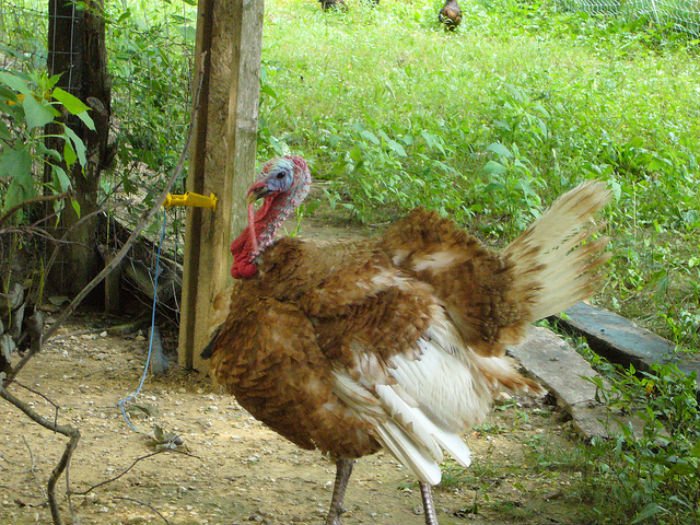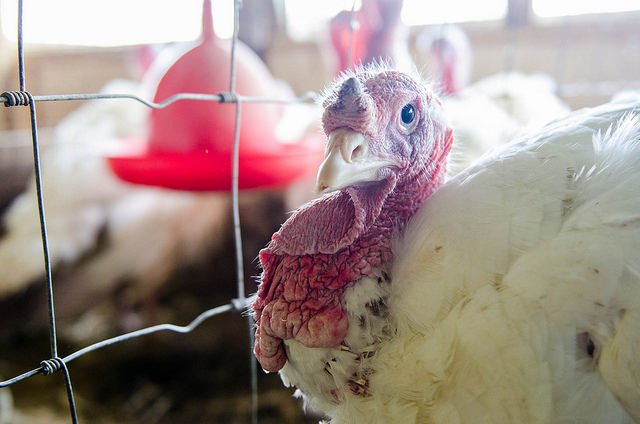The holidays are already expensive, so why in the world would you spend $160 on a turkey? Can you really justify breaking the bank for sustainability? It’s not easy to spend so much when it’s hard to see how your actions affect climate change, and the fight to end poverty. But here are some environmental and ethical reasons to invest in sustainable food choices this year, and evidence your choices do make a difference.
American consumption of turkey on Thanksgiving is staggering. One day accounts for 20 percent of all turkeys eaten in the US in one year. How many turkeys is that exactly? That’s about 46 million turkeys. That’s a lot of turkey, and that’s part of why I’m suggesting that you get to know the bird you cook this year.
Meeting your meat
Consider what it would be like to get to know your turkey. Meet your meat...eh? Sounds weird, but meeting your farmers and food isn’t such a bad idea. Labels today are tricky to navigate. Finding out what organic, local, and free-range even mean these days can be hard.
Did you know free-range by USDA standards technically means poultry “has had access to the outside?” If you’re left wondering (like in Adele’s new song, Hello) what does this “outside” mean? Or when and for how long is poultry “freely roaming?” There’s a way around this ambiguity. If you have the chance to talk to a farmer at a farmers market or to see images from a farm online, you can learn an incredible amount about the work that goes into raising a turkey “the right way.”
To raise the “golden turkey” there’s a reason it costs $5-7 US dollars per pound instead of $1.50. Farmers need more land because these turkeys roam freely and feed on organic peas and high quality grain--compared to turkey crammed into cages and fed cheap feed. Small farmers also need to be able to afford protection for free-roaming poultry. Incidents of attacks from coyotes, hawks, and others predators on turkeys can cause for farmers to lose up to 50 birds in one night. In addition, small-scale farmers of free-range birds and livestock have to put more thought and resources into figuring how to slaughter. There’s a lot of paperwork to complete if farmers slaughter the birds themselves, and hiring or sending animals off the farm is expensive too. Combine all of these factors, and it adds up quickly. Small scale sustainable farms don’t make massive profits, the cost of raising a super sustainable turkey is about $90 USD. In my opinion, these are the types of farmers who need subsidies and support, not big agricultural giants.

Even distributors such as Whole Foods, for example, face the dilemma of supplying upwards of 2 million Thanksgiving birds to shoppers who want ethical and sustainably raised turkey according to this article from Slate. But, finding funding to pay people to monitor small-scale farmers, who also struggle to meet consumer demands, can lead to lack of transparency as to how ethically raised animal agriculture is truly. So, literally meeting your meat can make a difference when it comes to sustainability.
This is just part of why it’s worth it to invest in sustainable food around the holidays--and year-round for that matter. The other reason is all about making long-term change in animal agriculture.
Creating change in animal agriculture
By investing in local farms who practice ecological farming, you’re supporting their philosophy and telling big poultry companies they need to change.
Often, it feels like consumers have no other choice but to buy low-quality, inhumane products. But this does not have to be the case, and the choices you make today will effect what is available in the future. And I get it--making these choices on a budget is hard. Which is why I suggest taking the holidays to incorporate sustainability, and ethical sourcing for food into your plans. Not only will you be able give one more thanks to yourself for taking the opportunity to improve the planet but it’s a good option if you (like most of the world) cannot afford to eat the way you want everyday. It will help build a future where unsustainable agricultural practices and unfair wages for workers no longer exist. When marginalized workers like those in factories and farms gain more rights and higher wages, everyone benefits.
Plus, through consumer choices, you can dictate the direction of the market. If together global citizens demand humane treatment for animals and workers (aka some “justice on the side” as Oxfam America points out in this article) companies will respond with the products you want. It takes time and patience but if you give them no other option, companies using unsustainable and harmful production methods will have to change. Of course, there should be laws that better monitor slaughterhouses and agricultural practices, and adequate funding to carry out laws in place. Making ethical sustainable poultry a priority this Thanksgiving sends a message to companies, and government programs meant to regulate human rights, ethics, and sustainability in agriculture that this issue matters.
Sustainability in animal agriculture does matter. Did you know animal agriculture accounts for 18 percent of greenhouse gas emissions? It’s a major cause of climate change, and pollution.

You have the power to end unsustainable practices by making ethically-minded choices. Just look at the recent trends your consumer choices have made. For example, companies like McDonald’s began marketing and selling healthier options in recent years, and even that was not enough to meet the needs of pickier consumers (hint: stock is way down.) So McDonald’s next move? No more chicken with antibiotics in the US, and no more milk with hormones. This is proof your consumption choices matter.
Alternative options to turkey
Still, spending over $100 US dollars on a turkey sounds ridiculous, and is not affordable for many people. So here are a few other options.
Another option if top turkey is out of your budget--try something new. Traditions are comforting but the holidays are also a great time to impress family and friends with your uniqueness. Alternatives to turkey could range from rabbit (usually raised quite sustainably) to quail, squab, pheasant, or a veggie or vegan main dish. There’s a lot more than Tofurkey available today. Personally, my favorite Thanksgiving dishes are already the vegetarians ones (Bonus recipes!Pie, mashed potatoes, and stuffing.) There’s also the ultimate compassionate move of adopting a real turkey.
For those struggling with hunger and poverty in the US, the holidays are a time when generosity is amplified and more hot meals are shared. Making ethical choices around the holidays makes it more likely that everyone can afford a sustainable meal in the future.
You can also help improve the lives of poultry workers by going to TAKE ACTION NOW and signing a petition for better rights and wages for workers in big poultry.